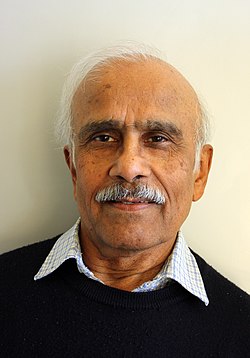Saral Sarkar
Thank you for being part of the Bharatpedia family! 0% transparency: ₹0 raised out of ₹100,000 (0 supporter) |
The topic of this article may not meet Bharatpedia's notability guideline for academics. (June 2018) |
This article may be expanded with text translated from the corresponding article in Deutsch. (June 2018) Click [show] for important translation instructions.
|
Saral Sarkar | |
|---|---|
 | |
| Born | Kalimpong, West Bengal, British India |
| Occupation | Writer, Academic, Activist |
| Language | German, English |
| Notable works | Eco-Socialism or Eco-Capitalism? – A Critical Analysis of Humanity's Fundamental Choices" |
| Spouse | Maria Mies |
Saral Sarkar (Bengali সরল সরকার), born 10 May 1936 in West Bengal, is an Indian-German academic and eco-socialist political activist. Sarkar taught at the Goethe Institute in Hyderabad from 1966 to 1981, as a lecturer in German. Since 1982, Sarkar has been based in Cologne, and has been a prominent figure in the European ecology and peace movement. Sarkar was also the secretary of the local Green Party of Cologne. In the 1980s, The United Nations University commissioned Sarkar to conduct an authoritative study of the Green movement in West Germany.[1] His resultant two-volume study, Green-Alternative Politics in Federal Republic of Germany was published in 1993. Sarkar was prominent in the anti-globalization movement from 1997 to 2005 and in active in political debate.[2] Sarkar's writings, in both English and German have been widely disseminated in numerous journals and his works have been published in English, Chinese, French and German.
Personal life[edit]
Sarkar is married to the sociologist Maria Mies.[3]
References[edit]
- ↑ Patrick Harrington; Terry Burgoyne (1 August 2006). Counter Culture Anthology. Lulu.com. pp. 82–. ISBN 978-1-84728-118-0.
- ↑ ICSSR Journal of Abstracts and Reviews: Sociology and social anthropology. National Publishing House. 2000.
- ↑ Lokayan Bulletin. Lokayan. 1995.
- All articles to be expanded
- Articles needing translation from foreign-language Wikipedias
- 1936 births
- 20th-century German writers
- 20th-century Indian writers
- Bengali educators
- Indian socialists
- German socialists
- Ecosocialists
- German people of Bengali descent
- German feminists
- Indian feminist writers
- Living people
